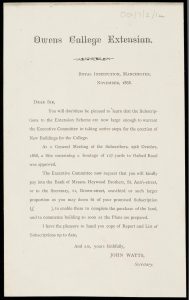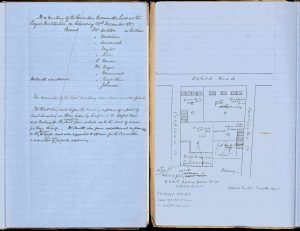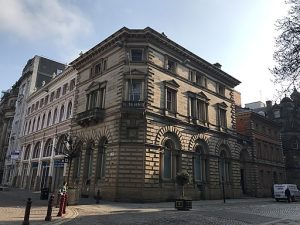Exploring the Legacies of Slavery and Colonialism at The University of Manchester
Written by Dr Kerry Pimblott and Mary Booth
Race, Migration & Humanitarianism: Legacies of Slavery and Colonialism in the Modern World (HIST64101/65101) is a recently developed team-taught module offered as both a 30-credit core and 15-credit option for MA History students at The University of Manchester. The module is integral to the History Department’s efforts to respond to the Royal Historical Society’s Race, Ethnicity & Equality Report (2018) by better embedding equality and diversity considerations into teaching and learning practices. Among the report’s major findings was ‘the absence of difficult and challenging histories such as Empire and decolonisation from school and university curriculums’. At Manchester, we have a strong undergraduate programme in these key areas, but gaps existed in our postgraduate offer. These concerns were broadly reinforced by an internal curricular audit and student focus groups conducted by our colleagues in the subfield of modern British history in 2018/19 (read full report here). Students emphasised the importance of making curricula interventions to address these silences and exclusions and create pathways for postgraduate training and research development in related fields.
Spurred by these activities, Race, Migration & Humanitarianism brings together a team of historians with research specialisations in the long histories of slavery and colonialism in Africa, Asia, Europe and the Americas. Students receive a grounding in the global history of the Trans-Atlantic Slave Trade (TST), colonisation, and “decolonisation” before examining the multiple and complex legacies of these world historic phenomena in the present. The teaching team applied for Social Responsibility funding to design a new modular activity and assessment that would allow students to critically engage the legacies of slavery in the places they live, study, and work – Manchester and, more specifically, The University of Manchester. Modelled on research undertaken by Dr Stephen Mullen and Professor Simon Newman at the University of Glasgow, this modular activity will afford postgraduate students an opportunity to explore the nature and extent of the financial benefits accrued to the University because of historical racial slavery. It builds upon the pioneering work of University of Manchester scholars Professor Natalie Zacek and Dr Matthew Stallard (now of University College London; UCL) as well as the recent Race Matters report, in which campus leaders committed to ‘undertake analysis of the key connections between early benefactors of the University and the global slave trade’.
Funding from this grant was used to hire a postgraduate research assistant (Mary Booth, History) to perform exploratory research, build project partnerships, and co-design activities related to the legacies of slavery at the University of Manchester. This summer, Mary has been working to construct biographies of nineteenth century benefactors associated with both Owens College and the Manchester Mechanics’ Institute with a focus on identifying familial links to the TST, the Caribbean plantation system, and mercantile firms involved in the trade of cotton and other slave-produced commodities. To achieve this, Mary employed a methodology that involved cross-referencing a combination of sources including published accounts, manuscript collections, and UCL’s Legacies of British Slavery Database. Manuscript collections of particular importance to this project include the Owens College Archive and the Archive of the Manchester Mechanics’ Institute both held by Special Collections in The University of Manchester Library. Mary has worked closely with Special Collections staff to identify, locate, and digitize key documents from these collections for use in the academic year 2021/22. She has also constructed preliminary biographies of key individuals and families who were enriched by the slave trade or slave-produced commodities and made important financial and administrative contributions to these forerunner institutions.
Among them were the Heywood’s, a family whose story is one of commerce, familial enterprise and a vast fortune amassed from the slave trade that was reinvested back into the British nation, including in early educational institutions now a part of The University of Manchester: Owens College and Manchester Mechanics’ Institute. The family’s connection to mercantile trade was one of generational ties. In the 1730s, the founders of the Heywood empire, Arthur and Benjamin Heywood, moved to Liverpool and successfully integrated themselves into the thriving economy of the port city built upon the TST. This growing dynasty soon branched into other ventures, including banking, and became a birth right, with new generations of Heywood’s taking over their father’s companies. In the 1770s, Benjamin Heywood dissolved the partnership with his brother Arthur and moved to Manchester to set up an independent bank with his sons, Benjamin Arthur and Nathaniel Heywood. This bank, which became known as “Benjamin Heywood, Sons & Co”, was passed down to each new generation, including Nathaniel’s children, and in 1828, after the death of his father and the retirement of his brothers, Sir Benjamin Heywood became the sole proprietor of the banking business in Manchester, located on St. Ann’s Street (see image below).
This financial institution, created through the wealth generated from capturing, forcibly transporting, and enslaving thousands of men, women and children, as well as the trade of enslaved created commodities including cotton and sugar, was used to bolster the position of the Heywood family in both Manchester and Liverpool, and integrate them as prominent members of society. Sir Benjamin Heywood, a Member of Parliament in 1831, used his fortune and political influence to assist in the establishment of the Manchester Mechanics’ Institute, making the initial contribution to the university in 1834 and acting as the university’s first president from 1834-1841. His proclivity for educational work was passed down to his son, Oliver Heywood, who also inherited his father’s bank on St. Ann’s Street, which he renamed “Heywood Brothers & Co”. Oliver, like his father, served on the Board of Directors at Manchester Mechanics’ Institute and made numerous donations to the university. Oliver also expanded the family’s influence in the education field, serving on the Court of Governors for Owens College. In addition, he served as Treasurer for the expansion of Owens College in the late 1800s. The document photographed below is a request for funding to pay for the extension of the institution, stating that funds were being collected at the Heywood’s bank in the heart of Manchester.

College extension fund request, asking those donating money to do so through the Heywood bank (image courtesy of The University of Manchester Library)
Also involved in the Owens College extension project was Murray Gladstone. Born in 1816, Murray was the son of Robert Gladstone and connected to a wealth generated through slavery much like the Heywood’s. Robert’s brother (Murray’s uncle) was Sir John Gladstone, a very wealthy Scottish merchant and politician who amassed a great fortune through multiple ventures associated with slavery including, but not limited to, plantation ownership in the West Indies, the shipments of enslaved produced commodities, and insurance on ships that moved throughout the Atlantic. To explain just how wealthy John was, here are the profits from just one of his business ventures: after the abolition of slavery John Gladstone submitted eleven different claims for his properties in the West Indies and made an estimated £106,769 from government compensation (estimated to be between £10 million and £135 million today). This vast wealth accumulated through years of enterprise and was dispersed throughout his family, including his brother Robert, as the two were partners until separating ways in 1821. Robert continued to invest in slavery in his own right, receiving one of the largest payouts for a single plantation in the West Indies: a total of £9,225. This money along with the family’s other accrued assets were passed down through the generations and inherited, in part, by Murray Gladstone.
Murray Gladstone was very active in the academic world, specifically at Owens College, and is a prominent figure throughout the archive: nominating Life Governors, chairing Court Meetings, as well as working on the Owens College extension. According to the Chaloner and Behrens publication detailing the institution’s extension, ‘in March 1868 Gladstone purchased secretly a large and cheap site of about 4 acres in his own name and at his own risk; it contained 19,164 square yards and cost £29,100, forming an oblong plot, with a frontage of 127 yards to Oxford Street, and extending about 152 yards down Burlington Street on the south, and 177 yards down Coupland Street on the north.’ [1] The notes pictured below are from the meeting in which Gladstone detailed the land he would donate to the University, including a diagram of the site upon which Whitworth Hall, the Student Services Centre, and possibly the Beyer Building sit today.

Meeting minutes from December 28th, 1867, discussing Murray Gladstone’s donation to Owens College, with a diagram of land plot (image courtesy of The University of Manchester Library)
In the academic year 2021/22, we will build upon these and several additional donor biographies to deliver a bespoke postgraduate workshop focused on the legacies of slavery and colonialism at Manchester. Students will be introduced to the emergent literature on the relationship between universities and racial slavery as well as the key historical research methods and skills required to undertake this work at The University of Manchester. Students will also be introduced to the Special Collections team and provided with the opportunity to produce a final essay on the topic drawing upon original manuscript collections. It is our hope that this unique research experience will encourage students to pursue further research on the topic for their Master’s and PhD dissertations. More expansively, this work will play an important role in establishing knowledge and understanding of the legacies of slavery at The University of Manchester providing a foundation for reparative initiatives.
[1] W. H. (William Henry) Chaloner and Leonard Behrens. The Movement for the Extension of Owens College, Manchester, 1863-73 Manchester: Manchester University Press, 1973 (found in John Rylands), pp. 8-9.
Project duration: Summer 2020 – Present
Project leads: Dr Kerry Pimblott (Dept. of History, UoM), Mary Booth (PGR, Dept. of History, UoM)
Internal Partner: UoM Library
Audiences involved: UoM postgraduate students
Funding source: SALC Social Responsibility Award


0 Comments